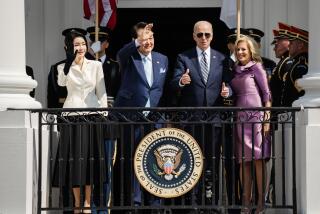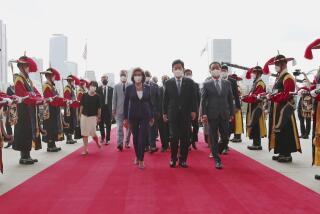Soros Says He May Boost Investments in S. Korea
- Share via
SEOUL — In another positive sign for this nation’s battered economy, international financier George Soros told President-elect Kim Dae Jung Sunday that he’s interested in increasing his investments in South Korea.
The move was welcome news for South Korea, which is trying to woo back foreign investors as it rebuilds its financial system with the help of a $60-billion bailout from the International Monetary Fund.
Despite the sizable bailout and other signs of international support for South Korea, many foreign investors remain reluctant to renew loans to the country. Seoul officials hope that Soros’ visit will encourage other investors to put money back in South Korea.
“Mr. Soros said he would like to help South Korea as far as he can,” Chung Dong Young, chief spokesman for Kim, told reporters after the two-hour dinner meeting at Kim’s home outside Seoul.
Soros, who reportedly withdrew most of his investment from South Korea at the height of the nation’s financial turmoil late last year, had arrived Saturday to meet with Kim.
The two reportedly hit it off during a video conference arranged by Kim a few days before the South Korean opposition leader was elected president on Dec. 18.
Although Kim does not take office until Feb. 25, he already has immersed himself in efforts to save the battered economy.
During the meeting, Soros proposed that South Korea set up a new investment company to handle bonds underwritten by the government, Chung said. Soros said he would be interested in buying such bonds.
Soros also promised to send an investment research team as soon as he returns to New York today to advise the Seoul government on ways out of its economic crisis.
The American investor also told Kim that South Korea must “faithfully and swiftly” abide by conditions set by the IMF, other aides said.
Those conditions include reforms to make layoffs easier so that foreigners can take over South Korean banks and corporations. Currently, layoffs are virtually impossible without the consent of labor unions.
South Korea so far has received $11 billion in emergency loans under the IMF bailout, but its financial crisis will not end without loan rollovers from foreign banks and investors, analysts say.
More to Read
Sign up for Essential California
The most important California stories and recommendations in your inbox every morning.
You may occasionally receive promotional content from the Los Angeles Times.










